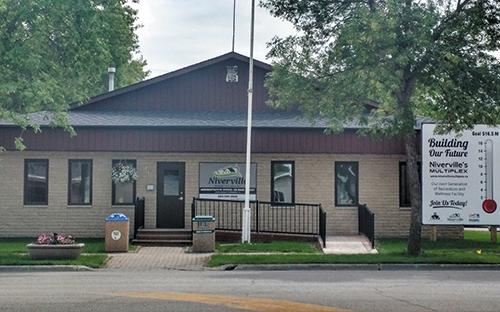Niverville council held a brief meeting on the evening of Tuesday, February 19 with two council members missing as they vacation. A number of important issues hit the agenda.
Council has come to a much-anticipated agreement with CP Rail to create two sidewalk crossings across the railway tracks dividing east and west Niverville. The crossings will be located immediately north and south of Main Street. The cost to the town is not to exceed $80,000.
Costs for the installation of the sidewalk crossings will fall on the town and will include the extension of sidewalks from Chicken Chef and JWH Water Services on the east side, across the tracks, to connect with sidewalks on the west side. CP Rail will take the initiative to improve the vehicular crossing on Main Street.
The railway project will include concrete slabs poured on either side and in between each set of tracks which will sit level with the tracks, eliminating the current bumpy crossing for motorists and creating an ease of crossing for pedestrians and bicycles.
Eric King, Niverville’s CAO, says that CP Rail does not, by law, have to install crossing arms or other safety features until vehicular numbers or a notable concern of risk would substantiate such a move. King hopes to initiate a means to calculate vehicular and pedestrian numbers this fall as new businesses open on the west commercial corridor and the new school draws in greater traffic from the east. He hopes that such evidence will be enough to merit CP Rail’s investment in further safety features in the near future.
The completion of the current crossing plan is expected for September 1.
Council also revealed a plan to help the community celebrate its fiftieth anniversary, as Niverville was incorporated in 1969. Council is working with town staff to plan a community-wide celebration on September 8. Event details have yet to be finalized, but they will be announced in the coming months.
Finally, council has received and had the opportunity to review a police study that was commissioned last year. The study looks at a variety of policing options for the town. The study tender was granted to Rick Hiebert, former police chief for the city of Winkler, in 2018 at an approximate cost of $10,000.
“After having an independent police study completed… and having given Niverville town council time to review the report, town council has set a strategy for policing going forward,” says Mayor Myron Dyck. “In setting the vision, council sees benefit to a hybrid model of retaining the RCMP service but augmenting [it] with stronger municipal enforcement mechanisms.”
What this means for the community going forward is the continuation of an RCMP presence for “higher level” services requiring their trained expertise. Council will be looking at a number of ways to manage the “lower level” policing requirements, such as education, surveillance, theft, and Highway Traffic Act violations.
“While council acknowledges that the RCMP have it in their duties to provide service for lower level policing, the reality is that all things not lower level are consuming their time and limited resources and that this is not likely to change anytime soon,” Dyck says. “Thus, council sees it as necessary to assist and lower the pressure on the RCMP services… [using] municipal resources.”
These resources would include adding more security cameras around the community to discourage illegal activity and assist the RCMP in documenting incidents. Council would employ staff to provide real-time monitoring of the camera footage, especially during the night hours when more surveillance is needed.
Council will continue to work with volunteers and community groups such as COPP for a safer community. They will also investigate technology and innovation to assist with ground-level policing.
Since the release of the policing study, council met with the Department of Justice to make two requests. The first was that greater power be given to bylaw enforcement officers, granting them the ability to issue traffic tickets, over and above enforcing community bylaws. If such legislation is adopted by the province, council would move toward hiring its own full-time bylaw enforcement officer and discontinue the part-time contract position they have now.
The town’s second request of the province was for greater power to be given to Community Safety Officers (CSOs), a program established by the Province of Manitoba to augment policing services. While CSOs currently have the authority to apprehend suspects in cases of alcohol and drug consumption in public places, council would like to see their power extended to the apprehension and questioning of people involved in suspicious activity. Council also recommended that CSOs be provided the authority to carry necessary weapons, aside from a gun. Under these circumstances, council would also be prepared to hire CSOs to monitor the community.
“Niverville town council sees [this] hybrid model… as a less expensive option than developing a full-fledged municipal police force as a way to deliver the desired results of a safer community,” says a council press release. “This policing strategy will be reviewed annually and will include annual meetings, or more as needed, with the Department of Justice and the ‘D’ Division of the RCMP. By having a hybrid approach, council believes that flexibility exists to have policing that meets the needs of the community in the years ahead.”


